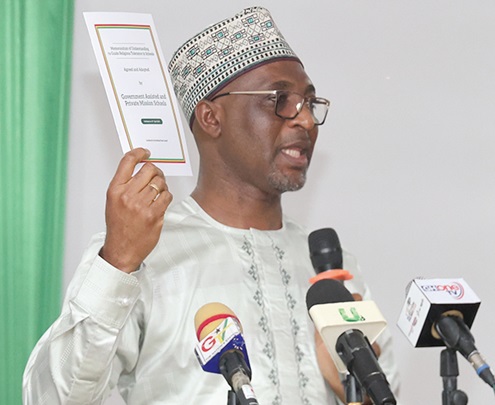The Minister for the Interior, Muntaka Mohammed-Mubarak, has called on stakeholders to prevent religion-based discrimination to promote social cohesion in schools.
Speaking at the launch of a Memorandum of Understanding (MoU) for government-assisted faith-based schools (private mission schools), he said there was a need to create an environment where religious differences would not only be tolerated but celebrated.
"By so doing, we will strengthen the partnership between government, mission schools and communities, upholding the values of peace and unity in nurturing our future leaders," he added.
MoU
The MoU is to guide religious tolerance and promote religious tolerance in government-assisted and faith-based schools.
![]()
The document was developed by the Conference of Managers of Education Units (COMEU) and was facilitated by the National Peace Council.
It was validated on April 15, last year, and endorsed by the Director-General of the Ghana Education Service (GES) on April 11, this year.
The MoU was endorsed and signed by 13 major religious missions, including the Catholic Church, the Evangelical Presbyterian Church, the Methodist Church, the African Methodist Episcopal Church, Assemblies of God Church, the Ghana Baptist Convention and the Office of the National Chief Imam.
The rest are the A.M.E Zion Church, Anglican Church, the Salvation Army, the Presbyterian Church of Ghana, the Ghana Police Education Unit, the Garrison Education and the Ahmadiyya Mission.
The MoU is to enable a safe learning environments, prevent discrimination on religious grounds to enhance greater social cohesion and promote national peace.
The document was born out of extensive stakeholder consultations, including the Ministry of Education, GES, Christian, Muslim and traditional leaders, as well as school authorities to address the challenges head-on.
Observances
Mr Mohammed-Mubarak also advised government-assisted and private mission schools against policies that compelled students to adopt religious observances against their will.
He added that faith must not be imposed, but lived with respect for others.
The Minister for the Interior stressed that both the Constitution and moral values called for respect and balance.
Drawing on both Christian and Islamic teachings, he emphasised the need for tolerance and fairness in mission schools.
Commitment
Mr Mohammed-Mubarak said the government was committed to promoting peace and social cohesion across all sectors of the society.
"We pledge our continuous support through ministries, agencies, and programmes to ensure that this MoU is not only implemented but becomes a living document that shapes the culture of our schools for generations to come," he added.
Mr Mohammed-Mubarak underscored the importance of the agreement as a framework to address growing tensions over religious practices in mission schools.
He lauded the role of mission schools in shaping “leaders, professionals and citizens who embodied integrity, discipline and service.
The Interior Minister, however, acknowledged that recent incidents of conflict such as disagreements over the wearing of the hijab, participation in prayers, and other faith practices had threatened the harmony long associated with mission schools.
“These incidents, though isolated, pose a risk to the unity and inclusivity of our educational landscape.
We cannot allow them to undermine the legacy of quality education and moral integrity that mission schools have given to our country,” he added.
Mr Mohammed -Mubarak, therefore, called on all stakeholders, religious leaders, educators, parents, and students to embrace the agreement as a collective responsibility.
Collaboration
The Deputy Minister of Education, Dr Clement Apaak, reaffirmed the ministry’s commitment to collaborate with the stakeholders to roll out sensitisation programmes to raise awareness about the MoU.
He described education as “a sacred space where every child, regardless of their religious background, should feel respected, valued, and empowered to reach their full potential.”
He further cautioned that peace was not automatic but must be nurtured, warning that unresolved religious misunderstandings could erode the trust and cooperation that was sustaining Ghana’s education system.
The Board Chairman of NPC, Most Rev. Emmanuel Kofi Fianu, thanked religious leaders, educators and stakeholders who contributed to the agreement, calling it a “unified commitment to fostering harmony in our schools.”
He described the MoU as a “landmark covenant” that provided binding guidelines for handling issues of fasting, hijab-wearing, and religious practices in schools, ensuring that students of all faiths were respected and protected.
He reaffirmed the longstanding role of missions in the country’s moral and educational development, adding that, “The signatures reflect “a bold step towards unity and religious tolerance”.
These incidents, Rev. Fianu said, had exposed gaps in the educational system’s approach to religious diversity and risked undermining the peaceful coexistence guaranteed by the 1992 Constitution.
He called on parents, teachers, students and the wider Ghanaian society to join hands in building schools as sanctuaries of harmony, of learning and religious tolerance.

